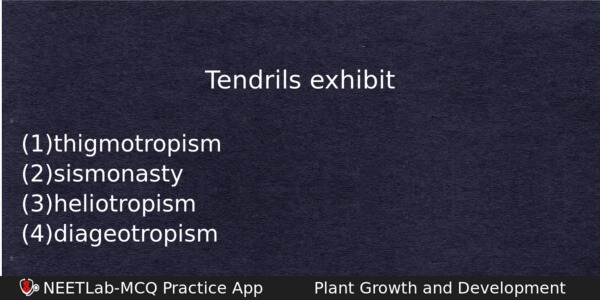| ⇦ | 
| ⇨ |
Tendrils exhibit
Options
(a) thigmotropism
(b) sismonasty
(c) heliotropism
(d) diageotropism
Correct Answer:
thigmotropism
Explanation:
Thigmotropism is a directional curvature movement of growth which is produced in response to the stimulus of contact. It is most conspicuous in tendrils which coil around support and helps the plant in climbing. Phototropism is a paratonic directional growth movement of curvature which is induced and determined by the direction of light stimulus. Nastic movements are non-directional movements in which the response is determined by the structure of the responsive organ and not by the direction of the stimulu
Related Questions: - Which of the following fruits are found in the family ranunculaceae?
- Function of embryonal suspensor in angiosperms is to
- Aromatic amines used in the manufacture of synthetic dyes cause cancer of
- Which one of the following areas in India, is a hotspot of biodiversity
- A yellow substance oozing out from wound has
Topics: Plant Growth and Development
(126)
Subject: Biology
(4253)
Important MCQs Based on Medical Entrance Examinations To Improve Your NEET Score
- Which of the following fruits are found in the family ranunculaceae?
- Function of embryonal suspensor in angiosperms is to
- Aromatic amines used in the manufacture of synthetic dyes cause cancer of
- Which one of the following areas in India, is a hotspot of biodiversity
- A yellow substance oozing out from wound has
Topics: Plant Growth and Development (126)
Subject: Biology (4253)
Important MCQs Based on Medical Entrance Examinations To Improve Your NEET Score
18000+ students are using NEETLab to improve their score. What about you?
Solve Previous Year MCQs, Mock Tests, Topicwise Practice Tests, Identify Weak Topics, Formula Flash cards and much more is available in NEETLab Android App to improve your NEET score.
Share this page with your friends

Leave a Reply